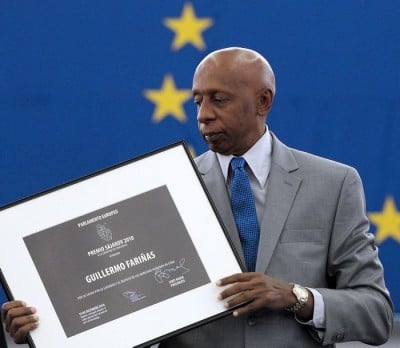
Cuban dissident and long-term prisoner of conscience Guillermo Fariñas was able to pick up his Sakharov Prize yesterday at the European Parliament in Strasbourg. As usual, the news media of the so-called free world paid scant attention to this event.
Only a handful of news organizations –most of them Hispanic — gave space to the story. ABC Spain published a wonderful interview with Fariñas yesterday (see the bottom of this post for a link), but has yet to report on the prize ceremony or on what this Cuban version of Nelson Mandela had to say.
Once again, the news media overlooks the parallels between the struggle of the Cuban people and that of South Africans three decades ago, even though Cuba today has hundreds of prominent dissidents of great moral stature (and tens of thousands who are now in exile or dead). Let’s hope the European Parliament follows up on this award by listening to Fariñas and all the Cuban dissidents who are asking for tougher sanctions on the Castro Kingdom.
From European Parliament News:
Fariñas: Cuba will change only when power is in the hands of the people
Cuban dissident Guillermo Fariñas has finally been able to pick up his 2010 Sakharov Prize in person in the European Parliament in Strasbourg after waiting for almost three years to be allowed to travel to Europe. “You are not alone in this long journey to freedom and democracy,” Parliament vice-president Gianni Pittella, an Italian Social Democrat, told Fariñas during the award ceremony. We asked Mr Fariñas about his struggle, the prize and the current situation in Cuba.
How has the prize helped your fight for freedom of thought?
Personally, I can say that violent acts against me by members of the state security forces or paramilitary groups have diminished, but at the same time, many people are still being imprisoned. The importance of the prize resides in that every time a Cuban citizen receives an award for the defence of human rights, the Cuban regime is set in a delicate situation vis-à-vis the rest of the world and democratic institutions.
Is your visit to Strasbourg a sign of things improving in Cuba?
Not at all: dissidents that have left our country are well known and, for this reason, we are shielded by international public opinion. The same does not apply to those who are less well known.
At this moment, there are 101 political prisoners in Cuba when in 2010 there were only 38. Indeed, the Cuban regime carries on with violent acts against dissidents and the legal framework remains intact.
What would it take to see real improvement in relation to human rights in Cuba?
Only when the Cuban regime recognises that the power has to be in the hands of the people and political dissent will not be a crime, we will be able to say that something has changed in Cuba.
For a longer article from El Universal (in Spanish) , go HERE.
And… for a great interview with ABC Spain, go HERE. (in Spanish)

